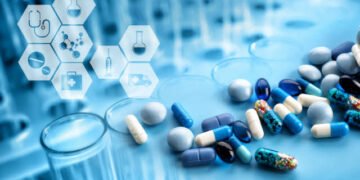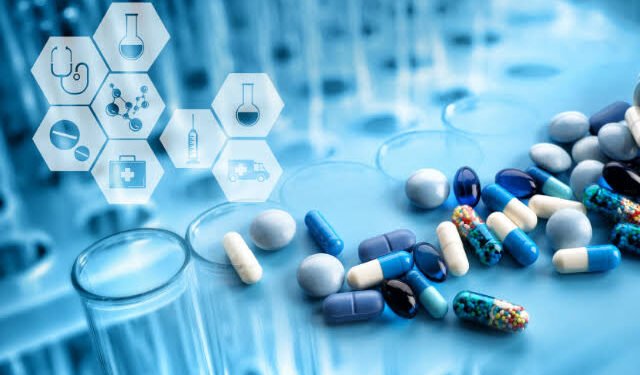Prices of vital pharmaceuticals and health care have risen recently, causing care seekers and practitioners to suffer the inflationary effects of floating the Naira and subsidy elimination.
On Monday 5th of July 2023, results indicated that certain medications are selling out or becoming costly. Though, the Federal Government wants to cut medication imports from 60% to 40% to support local manufacture, at least 70% of medicines consumed in the country are imported.
After over a month after the Central Bank of Nigeria (CBN) shut down the foreign exchange (FX) market, the issues have grown more entrenched, disturbing individuals and companies.
Locally made pharmaceuticals use active pharmaceutical ingredients (APIs) from neighboring nations, especially those without raw resources.
K|emi Ashefon found that medicine and medical service costs jumped by at least 60% to 150% in two months, supported by physicians and pharmacists.
Some months ago, Ventolin Inhaler Brand of Salbutamol by GSK Pharmaceuticals cost N4,500 a canister, but today it costs between N6,500 and N12,000 in some retail outlets.
Also, 10 ciprofloxacin 500mg pills cost N2,500. Today, a 10-tablet sachet costs N3,500. Two months ago, Rocephin 1g injectable (Ceftriaxone) cost N4,500 per vial. Today, it costs over N6,500, a sachet of 14 Co-Amoxiclav (Amoxicillin and Clavulanic Acid 625 mg) pills cost N5,000. Today, it costs N7,000.
Even domestically made paracetamol has skyrocketing pricing. Two months ago, a 12-tablet sachet of paracetamol cost N150. Today, some retailers charge N250 or more. Some months ago, Amatem, a brand of artemether Lumefantrine, cost N1,800 per six-gel sachet. Today, it costs N2,500.
“Seretide inhaler Brand of Salmeterol and Fluticasone) that cost about N5,500 two months ago, costs up to N11,000 today, where available.
“Removing fuel subsidies has resulted in sharp increases in medicine prices, ranging from 60 percent for paracetamol to over 150 percent for Ventolin Inhaler and others.”
Complications, including chronic illnesses and fatalities, may have increased. It has been reported that several people who could no longer afford conventional therapies turned to traditional medicine.
Doctors and pharmacists said that alternative medicine and unavailable pharmaceuticals affect treatment results, death, and morbidity. Life-threatening illness patients are susceptible since not getting their meds might kill them.
It has been found that most foreign medications are scarce and pricey. GSK, which supplies the country with vital antibiotics including Ventolin, Augmentin, Seretide, Cervarix (HPV vaccine for cervical cancer), Duodart, Zinnat, and Ampiclox, is out of stock and nearly expensive.
Clinical Pharmacist and Deputy Director Pharmaceutical Services, Dr. Kingsley Chiedu Amibor of Federal Medical Centre (FMC) Asaba, Delta State, said pharmaceutical prices had risen dramatically in the past two months, especially for imported items.
Former AHPN Chairman Amibor said low costs, sustainable finance, and trustworthy health systems provide access to needed medications. Universal health coverage can only be realized when safe, effective, and inexpensive medications and health supplies are available.
Given that costs have more than quadrupled while earnings have stagnated, the hospital pharmacist indicated that access to necessary drugs has already been hampered.
Amibor added, “Of course, it is already affecting healthcare delivery. Permit me to paint a true picture of the current situation: a good number of patients that manage to visit the hospital, after obtaining their prescriptions, get to the Pharmacy and learn the new cost of their prescribed medicines, some will tell you, “I am coming,” and disappear from the hospital and you will never see them again. Some may only afford two or three of five prescription drugs and quit the rest.
Due to drug shortages, optimum healthcare is impossible in both cases. Some hospitals can only buy crucial drugs in small amounts for affluent patients.
To address your question directly, the current situation has resulted in people not being able to get adequate treatment, especially their prescription medications.”
Amibor said most patients today struggle to get their prescriptions due to high pricing, which affects treatment results, morbidity, and death.
“This has major effects on treatment outcomes, mortality, and morbidity. He stated life-threatening sickness patients are susceptible since not getting their prescriptions might kill them.
Amibor said, “Looking at the cost of inhalers to treat asthma, how can a worker that earns a minimum wage of N30,000 a month, and is asthmatic, cope with buying two inhalers at N19,000 and still meet up with other obligations? He or she may use opportunity cost and skip drugs to eat one or two meals a day. Asthma will worsen.
Hospitalized septicemia patients. Their carers may run out of money and abandon the patient in the hospital. Patients who can’t pay leave hospitals everyday.
The pharmacist said that when patients can’t afford hospital and pharmacy prescriptions, they turn to unlicensed patent medicine stores or open drug markets for cheaper brands. He stated they buy fraudulent, low-quality, or non-medicinal items. “To answer your question directly, the current drug prices will result in some patients experiencing treatment failures, heightened morbidity and mortality for reasons explained above,” Amibor added.
Amibor stated the cost of getting treatment has grown significantly, affecting not just vital drugs but also medical procedures and operations like Caesarean Section (CS).
Like active pharmaceutical ingredients, most diagnostic equipment and reagents are imported and influenced by FX concerns. Amibor said surgical sutures are mostly imported and expensive because to limited currency access and high exchange rates. With fuel subsidy reduction, medical treatments have skyrocketed, he noted.
Dr. Dayo Adeyanju, former Ondo State Commissioner for Health, stated subsidy elimination raised health care expenses 20–50%. Some healthcare providers manage manufacturing costs to break even, resulting in high-cost health care that affects affordability, accessibility, and quality.
“This has raised the cost of all essential commodities, including health care consumables, making health care expensive. Pharmaceuticals, laboratory supplies, and labor are included.
Health professionals want more pay to keep up with growing costs. In late 2020 and 2021, COVID-19 increased healthcare supply input expenses.
Between 2019 and 2022, labor expenses per adjusted hospital discharge increased 25%, followed by medicines at 21%, supplies at 18%, and services at 16%. He stated subsidy elimination had raised health care expenses by 20–50%.
Adeyanju said patients pay over 70% of the cost of care, and some have led to catastrophic expenditure that has harmed individuals. The doctor added it has increased mortality, especially for medical conditions like hypertension and diabetes, where patients who cannot go on drug break have to forgo their treatment owing to cost.
Adeyanju said, “As government is considering palliative, one thing to consider is to strengthen our health insurance to have pooled funds and share the risk of health care cost among the citizens. Subsidizing premiums and covering the impoverished to achieve universal health care requires subsidy removal savings.
Public-private partnerships for Corporate Social Responsibility (CSR) enrollment are needed. The administration is already considering worker welfare as a cushion for increased costs.
“Local production of some of these commodities will also lower costs and improve healthcare affordability.”
Dr. Jumbo Eniefiok Hezekaih, Vice President, National Association of Resident Doctors (NARD)/Chairman, NARD committee on Medical Education, stated a malaria medicine that cost $1200 now costs $2800–$3200.
Hezekaih claimed low worker and patient attendance forces seminars and academic activities to be shelved or virtual. He said that health professionals who were hopeful things would improve are now prepared to “Japa” (leave the nation for greener pastures).
“Your guess is as good as mine, poor follow-up visits and treatment failure, increased morbidity and mortality,” the resident doctor stated.
He stated health insurance is not reaching its intended efficacy, hence the growth in drug costs, and if nothing is done to alleviate the pain, it would only get worse.
Mrs. Adaeze Omaliko, consultant pharmacist and medical director of Malix Pharmacy in Onitsha, Anambra State, said: “Drug prices are very terrible, some went as high as 200 per cent increase while some hundred per cent. Drug prices are rising, preventing many from going to hospitals and killing many. It’s hard for the average person to obtain, hence death rates are high.”
Last month, Nigerian pharmacists complained GlaxoSmithKline medicine shortages. They blamed COVID-19, supply chain shortages, and foreign exchange shortages.
They claim that shortage has tripled medicine costs.
Adewale Oladigbolu, president of the Association of Community Pharmacists of Nigeria, blamed supply chain shocks and COVID-19 for the shortage.
“GSK and other company drugs are scarce. Oladigbolu said GSK’s is pronounced since they sell popular products.
Oladigbolu said the shortage is affecting patient treatment. “The products have increased by over 300 percent and are not readily available. Patients will pay more for innovator brands, although there are generic versions. People worldwide prefer innovator brands.
“If the scarcity continues, patients may die,” he lamented.
The organization is working with industry leaders to tackle shortages.
Gbolagade Iyiola, head of the Lagos State Pharmaceutical Society of Nigeria, stated GSK medications including Ventolin, Augmentin, Seretide, Cervarix (HPV vaccine), Duodart, Zinnat, and Ampiclox are limited in the nation.
The challenge is forex. They have few items. Duodart is rare. Augmentin pills and Zinnat syrups are rare.
“For instance, we used to buy Ventolin at N1,200 and sell to other pharmacies at N1,800, but with the scarcity now, Ventolin is about N3,000 or N3,500. Prices are rising because demand is higher than supply.
Iyiola warned unscrupulous manufacturers may take advantage of the scarcity to make low-quality pharmaceuticals that harm people.
No of the CBN’s monetary strategy, the Nigerian government must make dollars available. Nigeria’s monetary policy hurts. Imagine if GSK made goods in Nigeria.
We’ll have this difficulty till manufacturing returns. To make Nigeria attractive for drug manufacture, he remarked.







